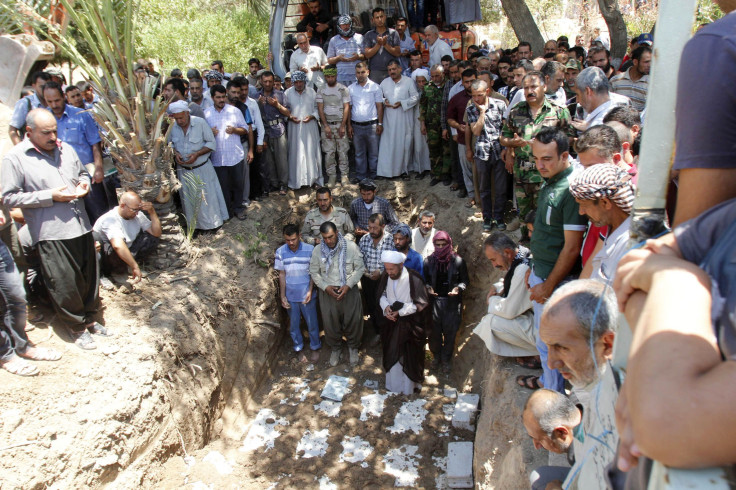ISIS Attacks On Shiite Villages Amount To Ethnic Cleansing, Experts Say

The conflict in Iraq is becoming increasingly deadly as militants affiliated with the Islamic State of Iraq and Syria continue to take over large swaths of land. The Iraqi and Kurdish militaries are fighting back, dropping bombs and launching rocket-propelled grenades at ISIS convoys, and for the most part, civilians have managed to sidestep the fighting. But there is another kind of fight brewing.
The fighting between the Sunni Muslim militant group and the Shia-dominated Iraqi military gives us a glimpse into the wider sectarian war plaguing the country. For years, Sunnis and Shiites have been in disagreement with each other about everything from politics to religion to shares of national wealth, and have fought for power. That infighting is now presenting itself on the frontlines in the form of ethnic cleansing -- a crime against humanity punishable under international law.
Ethnic cleansing is not easy to define, especially during wartime. At times, it is indistinguishable from forced emigration and it also merges with aspects of deportation and genocide. A 1993 report to the U.N. Security Council, during the Bosnian war, defined ethnic cleansing as “rendering an area ethnically homogenous by using force or intimidation to remove persons of a given group from the area.”
One of the first times the international community recognized ethnic cleansing formally was during the post-Yugoslavian wars of the 1990s. U.N. Security Council Resolution 780 in 1992 expressed “grave alarm at continuing reports of widespread violations of international humanitarian law … including reports of mass killings and the continuance of the practice of 'ethnic cleansing.'"
If ISIS continues its targeting of Shiites, Judith Yaphe, a professor at George Washington University’s Elliott School of International Affairs, said the violence in Iraq could amount to ethnic cleansing.
Earlier this month, ISIS, which formerly changed its name to the Islamic State after it declared the establishment of a "caliphate" Sunday, claimed responsibility for killing 1,700 government soldiers in Tikrit. Officials with the peshmerga, the Kurdish militia, told International Business Times on June 14 that ISIS had killed 200 people. Human Rights Watch later confirmed through its own analysis that ISIS killed about 160 Shiite army soldiers between June 11 and 14.
According to Human Rights Watch, “The evidence documented … strongly suggests that some of these acts may amount to crimes against humanity.” The U.S. State Department released a statement on June 15 calling the massacre “horrifying” and a “true depiction of the bloodlust that these terrorists represent,” the statement said. “One of the primary goals of ISIL [an alternative acronym for ISIS] is to set fear into the hearts of all Iraqis and drive sectarian division among its people.”
In light of the massacre, the U.S. and other governments ramped up efforts to help the Iraqi military fight the insurgency, but ISIS shows no sign of retreating. The violence, in particular the group’s targeting of Shiite villages, is instead increasing. On June 18, ISIS took over the town of Basheer, home to a predominantly Shia population. That marked the first time the militant group had attempted to take over an area dominated by Shiites. Most of the territory it holds in the north and west has Sunni Arab majorities.
On June 23, the Washington Post reported that villagers in Taza, a town just outside of Kirkuk, buried 15 bodies in a mass grave. Rebels executed all of them because they wanted to destroy Shiite Turkmen communities, according to the report.
For it to be considered a crime against humanity, ethnic cleansing has to be systematic or widespread, carried out against civilians, and intentional, according to human rights lawyers. For it to be considered a war crime as well, the situation in which it occurs has to be defined as war. In the case of Iraq, there is no formal declaration of war, therefore the ethnic cleansing occurring in the country would most likely not be considered a war crime by the international community.
Yet, if the international community believes that ISIS is committing ethnic cleansing in Iraq, there is not much, legally speaking, that it can do. ISIS is not a state recognized by anyone else, and has not signed the Rome Statute, the treaty that established the International Criminal Court. Therefore, it would be difficult to bring the case in front of the court and for ISIS leader Ibrahim al-Baghdadi, the self-proclaimed caliph, to be prosecuted for crimes against humanity.
With the improbability of prosecution under international law, ISIS is able to operate with almost total legal impunity.
© Copyright IBTimes 2024. All rights reserved.











